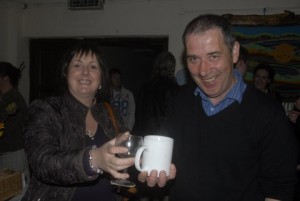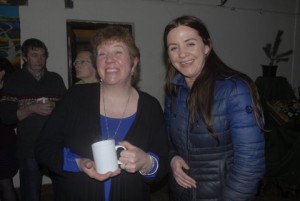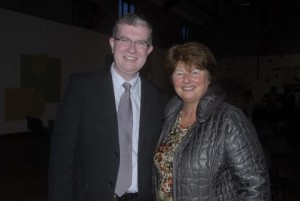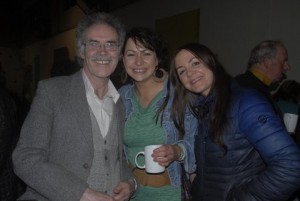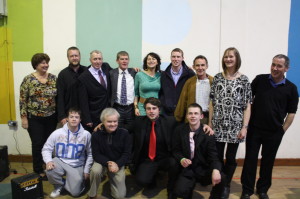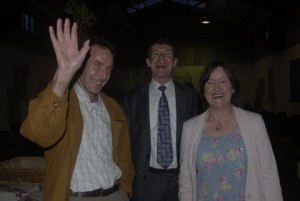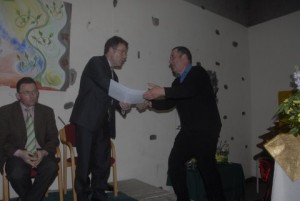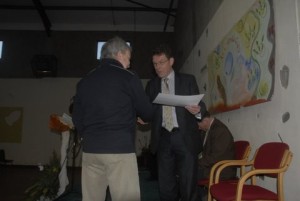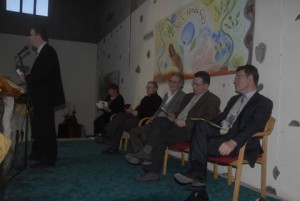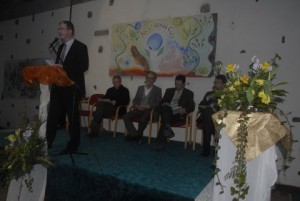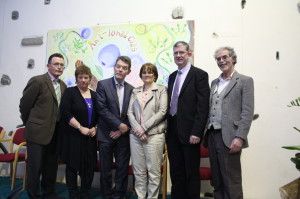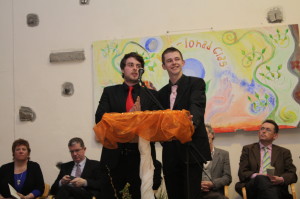We need a resilient agriculture and food policy!
Dr Colin Sage, a leading author on food and the environment and senior lecturer in U.C.C. called for a resilient agriculture and food policy, as the only way to reduce the worst extremes of climate change and to assure us of food security for the future.
Speaking to graduates of the Organic College in Dromcollogher on Friday last, Dr Sage said we were on course for even worse extremes of climate and more uneven growth, with temperatures set to rise by up to 3 or even 4 degrees in the years ahead unless serious changes to our greenhouse gas emissions were made. Ireland, he said is at the worst end of the E.U. countries scale in this regard.
The gathering of big names and in Dublin last week for an International conference was he said of limited use, when our Minister for the Environment was not prepared to match our concern with real targets of reducing our carbon output in the years ahead.
On the positive he said there were young people with vision, intelligence and commitment who are our hope for the future. Graduates of organics he said were in the vanguard of building a resilient agriculture and while having chosen the “road less travelled” this was one of the most meaningful careers that anyone could engage in.
Organic producers were he said “climate farmers and growers”, who affirmed independence from the petrochemical industry and its array of artificial fertilizers and chemicals, towards a really sustainable alternative.
You are he said, the stewards of the earth, the soil, the water and the landscape. Your science and craft of growing with living soils, is our best assurance of a truly diverse, balanced planet and a secure supply of food for an increa sing population. The quality of the food you produce is the most nutritious and healthy we can find of anywhere and when you preserve and add value to it, as we have tasted here tonight, you are on course to extend our home food season as well as reduce our dependence on imports.
In all of these areas of concern for food and the environment organics is the key, but you as producers need support from a food aware public. As well as economic and political sovereignty, we must learn to concern ourselves with food sovereignty. We must retake control of the food chain by seeking out and buying local, buying organic and buying fare trade. We must educate ourselves and our children to be aware of taste and of diversity of food, of nutrition and of global responsibility, so they become good food citizens.
The town of Dromcollogher which pioneered the dairy co-operative was he said again leading the way in way, through organic education towards a resilient and genuinely sustainable agriculture.
Gerard Griffin National Co-ordinator of the Vocational Training Opportuni9ties Scheme VTOS and representing the Department of Education and Skills, congratulated the graduates and especially their families and friends who were present at the ceremony and supported each learner on the journey of returning to education. Dromcollogher organic education and produce was he said well known throughout the country, he had tasted the college’s preserves at conferences where it was regarded as second to none. The Department of education and skills he said fully supported the innovation and enterprise which the college had shown over the past twenty years.
Rev Frank O Dea, Chairperson of the Board of Management, who lives close to the college, told the graduates their gardens were an inspiration. He noted particularly the early potatoes, some just coming into flower in a most difficult year, the result he said of care, of planning and the craft of growing. To care for the earth, was the calling of the scriptures and a pillar of the Christian tradition. The college, its graduates and the Friday market were an essential part of a dynamic, resilient and caring community.
Ms Paula Pender a graduate of the college and an organic grower from Carlow outlined how the college had pioneered Organic Education by Distance Learning. By using the technology of our time, a home or local library computer, a learner could get their weekly notes on line and engage in discussion on a variety of problems encountered in growing. This facility she said was particularly suited to people with young families or working part time, who could not commit to being full time learners.
There was now a growing on line organic community in touch with each other from Donegal to Wexford, exchanging ideas, sourcing chickens, seeds, compost, garden supplies and pollytunnels. Their coming to Dromcollogher on weekends for practical skills, workshops and examinations provide the face to face meetings and meant increased use of the college facilities the which the learners greatly appreciated.
Over seventy graduates from all around the country received awards at FETAC Levels 5 and 6, as well as Diplomas in Organic Enterprise from the Irish Organic Farmers and Growers Association IOFGA.
The college is currently taking applicants for its new cycle of courses starting this September, if you are interested you can apply on line by going to our Courses page or you can contact us by email ([email protected]) or phone (06383604) and we would be delighted to send you an application form.
